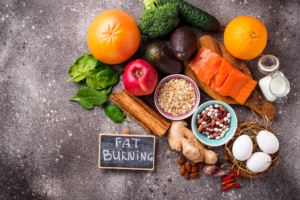You don’t have to be hungry all the time or feel deprived when you’re trying to lose weight. In fact, the only good way to lose weight that will last is to eat foods that make you feel full, feed your body, and help you lose weight without feeling like you’re always limited. These tips will help you lose weight without making you feel hungry:
Choose whole, nutrient-dense foods
Whole, nutrient-dense foods that give you long-lasting energy and fullness are one of the best ways to lose weight without feeling hungry. Fruits, veggies, lean meats, healthy fats, and whole grains that are high in fiber can all help you feel full for longer.
Fiber-rich foods, like fruits, veggies, beans, and whole grains, slow down digestion and make you feel full longer, which makes you less likely to want to snack. Lean nutrients from plants, like tofu, beans, and lentils, as well as chicken, turkey, and fish, are important for keeping you full and keeping your muscles healthy. Avocado, nuts, seeds, and olive oil are all good sources of healthy fats that can help you feel full and stop you from eating too much.
These foods make you feel full and give your body the nutrients it needs to stay healthy. This makes it easier to lose weight without feeling starved.
Put protein first in your meals
If you want to lose weight, eating protein with every meal will make a huge difference. Protein not only helps muscles heal, but it also does a great job of keeping you full for a long time.
Protein-rich foods can help keep hunger hormones in check and cut down on cravings. This makes it easier to stay in a calorie shortage without feeling hungry. Lean meats, eggs, cheese, vegetables, and plant-based foods like tempeh and quinoa are all examples of protein-rich foods.
If you want to lose weight, try to eat protein at every meal and snack. Protein will help control your hunger and keep you from feeling hungry.
Hold on to water and herbal teas to stay hydrated
People sometimes mistake thirst for hunger. Staying wet can help you control your hunger and stop you from eating too much. Aim to drink a lot of water throughout the day, and for extra water and relaxing, try plant teas like peppermint, chamomile, or green tea.
Having a glass of water before a meal can make you feel better, which may help you eat less overall. Herbal teas can be a pleasant, low-calorie choice to sugary drinks or food. They can make you feel full without adding extra calories.
Improving your habit by drinking enough water can help your body’s metabolism and general function as well as keep you from feeling hungry.
Pick foods with a lot of volume and few calories
Choosing high-volume, low-calorie foods is another good way to lose weight without feeling hungry. You can eat more of these things without getting too many calories, which helps you feel full without eating too much.
Some of the best foods in this group are vegetables. Bell peppers, cucumbers, tomatoes, and leafy veggies are all low in calories and high in fiber. They also add bulk to meals. Broths and soups made with veggies and lean meats can also help you feel full without giving you a lot of points.
If you focus on these foods, you can eat bigger amounts that will make you feel full without giving up on your weight loss goals.
Stay away from processed foods and refined carbs
Sugary snacks, highly processed foods, and refined carbs (like white bread and cakes) may make you feel full right away, but they can make you hungry again soon after. Because these foods are broken down quickly, they can cause blood sugar to rise and fall quickly, which can make you want to eat more.
Instead, eat whole foods that are high in nutrients and give you energy that lasts. Your body will be better fueled when you eat healthy fats, proteins, and complex carbs. This will keep you from getting hungry in the middle of the day, which can make you overeat.
Eat meals that are smaller and more often.
Eating smaller meals more often during the day is one way to keep from getting hungry. Instead of the usual three big meals, you might want to eat four to six smaller ones to keep your energy up and keep you from getting too hungry in between meals.
To keep you full, these meals should still have the right amount of protein, good fats, and carbs. If you want to avoid eating bad, high-calorie snacks when you’re hungry, pack snacks that are high in nutrients, like a handful of nuts, Greek yogurt, or a piece of fruit with nut butter.
You can keep your blood sugar levels steady and avoid feeling hungry by eating more often.
Learn how to eat mindfully.
Paying full attention to your food and the experience of eating is called mindful eating. It means taking your time, enjoying each bite, and paying attention to your body’s hunger signals. Mindful eating can help you feel fuller and stop you from eating too much.
Take smaller bites and chew each one well to slow down your food. If you want to enjoy your food more and feel fuller, don’t look at your phone or watch TV while you eat. Mindful eating helps you figure out when you’re really hungry and when you’re full, which makes it easier to control your portions and not eat too much.
Get a lot of rest.
Sleep is a very important part of controlling hunger. If you don’t get enough sleep, your body makes more of the hormone ghrelin, which makes you hungry, and less of the hormone leptin, which makes you feel full. This can make you want to eat more and end up overeating.
Aim for 7 to 9 hours of good sleep every night to keep your hunger hormones in check and stop eating when you’re upset. Getting enough sleep also helps your energy and metabolism, which makes it easier to stay busy and stick to your weight loss plan.
Getting enough good sleep is one of the most important things you can do to control your hunger and lose weight in a healthy way.
How to Effectively Handle Stress
When you’re stressed, you might eat for comfort instead of because you’re hungry. High amounts of worry can also make the body make more cortisol, a hormone that can make you store fat, especially around your middle.
Cortisol levels can be kept in check by doing things like deep breathing, yoga, meditation, or spending time outside. Regular exercise also helps you deal with stress and reach your weight loss goals.
You can keep a healthy relationship with food and avoid overeating by dealing with stress and hormonal causes.
Regularly work out
Regular exercise is important for losing weight and staying healthy in general. Working out burns calories, speeds up the metabolism, and keeps hunger hormones in check. Exercise can also help you feel less stressed and sleep better, which are both good for losing weight.
For the best results, do a mix of cardio (like walking, running, or riding) and strength training (like pulling weights or doing routines with your own body). Being active on a regular basis can help you lose weight without feeling starved because it makes you feel better, burns more calories, and cuts down on your hunger.
In conclusion
You don’t have to feel hungry or deprived all the time when you’re trying to lose weight. You can lose weight without giving up taste by eating whole, nutrient-dense foods, putting protein and fiber first, drinking plenty of water, and making healthy habits a part of your daily life. Remember that stability is key. If you make small changes to your lifestyle that you can keep up, you can lose weight and feel full, energized, and happy for a long time.




